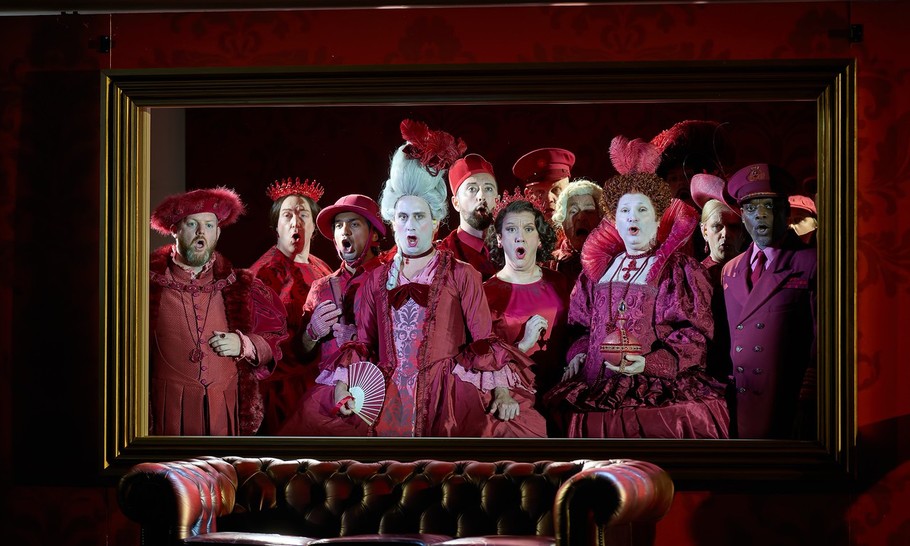Fun for all at the Coliseum: Rossini’s ‘Cinderella’

Chorus of ENO, ENO’s Cinderella (La Cenerentola) 2025 © Mark Douet (2).JPG
In Rossini’s version of Cinderella (La Cenerentola), the wicked stepmother is replaced by a pompous and uncaring stepfather, Don Magnifico; and the Fairy Godmother by a philosopher, Alidoro, the Prince’s tutor. And at the end, Cinderella is identified not by a glass slipper but by one of a pair of silver bracelets. The traditional supernatural elements that characterise the Cinderella story were removed by Rossini’s librettists for ease of staging, but this new production by the English National Opera — still hanging on despite cuts at the London Coliseum — has a stage magic all of its own.
Cinderella’s deceased mother is present throughout in a dress matching the pattern of the wallpaper, emphasising her silent but ubiquitous presence in the background. She also dances, along with five other professional dancers, injecting some joie de vivre to this intriguing staging. The courtiers in Prince Ramiro’s household appear in shades of red and a variety of costumes from times past, emphasising the family inheritance and expectations of the current prince, even demonstrating a liking for sport that he might be expected to follow. Add the occasional use of children in mouse costumes, as if they just stepped out of a production of Nutcracker, and you get the idea that the director Julia Burbach is throwing lots of ideas around in what amounts to a pretty eclectic staging of the opera. But I liked it and found it highly entertaining. As she says, “Cinderella is designed to be joyous, to make you laugh, and maybe offer a little insight”.
Rossini’s version provides the Prince with plenty of insight as he swaps roles with his valet Dandini. The aim is to visit the family incognito to observe the sisters, one of whom, Alidoro informs him, might make a very suitable wife. The family treats the prince, disguised as his valet, with disdain, but when Dandini himself arrives playing the role of the prince, the ugly sisters and their status-seeking father are all over him. This father, Don Magnifico later becomes completely bewildered, then furious, then obsequious, when the real prince tries to reveal to him that he has been hoodwinked by a role reversal. In the end, Cinderella forgives the obnoxious trio of her father and step-sisters, and all ends happily.
This performance buzzed with Rossinian energy under the baton of the Taiwanese conductor Yi-Chen Lin and the ever-excellent orchestra of the ENO. The principal singing roles were very well cast with Deepa Johnny making an agile-voiced and beautifully sung Cinderella, and Simon Bailey adding excellent bass heft as an engaging Don Magnifico. It’s a part that can be over-played in a very comic manner, but I preferred it this way. As the prince himself, Aaron Godfrey-Mayes showed a very fine Rossini tenor, if lacking the excellent stage presence of Charles Rice as his valet Dandini. As the wise and all-seeing Alidoro, David Ireland gave a very fine performance, along with witty contributions from Isabelle Peters and Grace Durham as the frightful sisters.
The original libretto is of course in Italian, but as with all ENO’s performances they use an English translation, in this case by Christopher Cowell, who managed to weave in some humorous contemporary references. This was very much set in modern times, using Rossini’s genius to help us laugh at ourselves. Well worth a visit, even if you’re not a regular opera goer.





